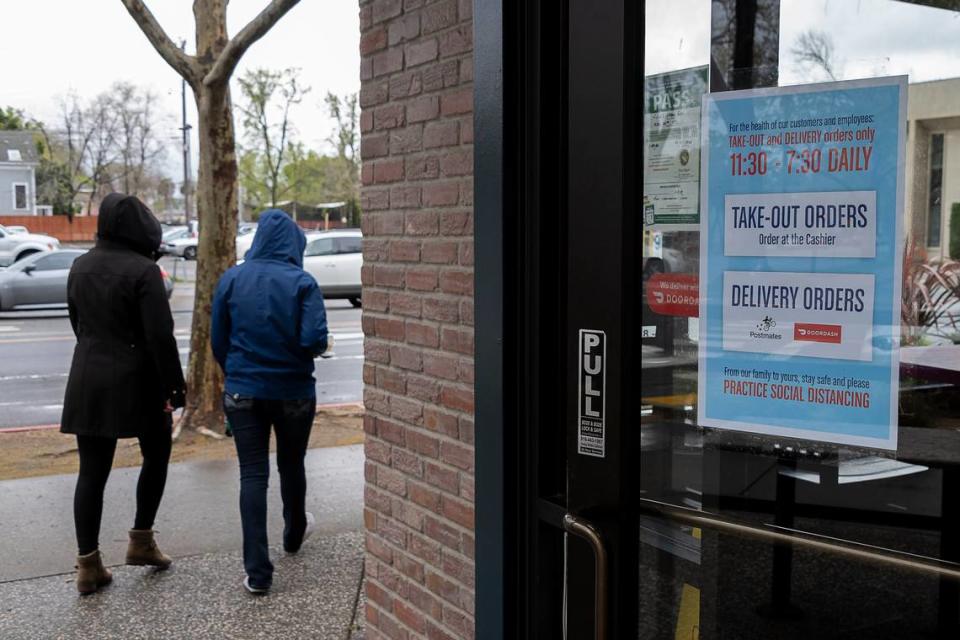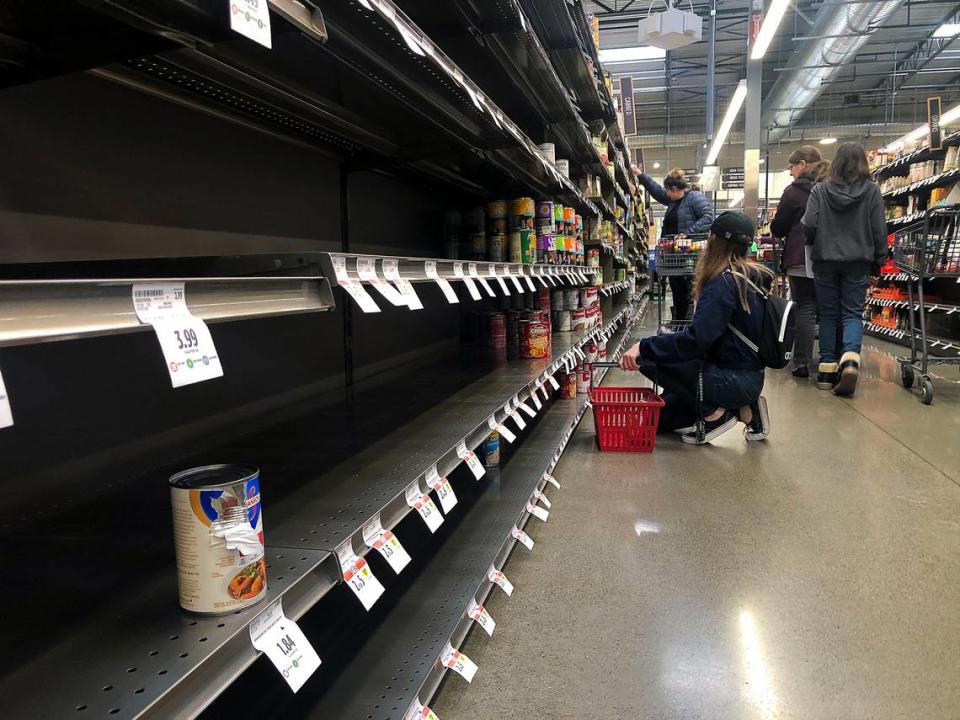Empty cafes, empty offices, empty bread aisles: Sacramento confronts life with coronavirus
On Monday, Sacramento stayed home.
The coronavirus pandemic, no longer a frightening inconvenience, became a force that upended practically every corner of everyday life. It sent schoolchildren home and sent restaurants begging for customers. Starbucks’ cafe culture evaporated as the chain would only fill to-go orders. Public and private sector employees transitioned to working from home.
After six Bay Area counties began issuing a “shelter in place” order, effectively banning all non-essential movement within the region, Sacramento County officials began deliberating whether to take similar measures.
As if things weren’t depressing enough. At the Ambrosia cafe, a usually bustling sandwich and coffee shop a block north of the Capitol, just three customers were inside at mid-morning.
“I just laid somebody off, and another person off,” said Kim Anderson, the cafe’s manager. “I’m going to lay off one more, at least one more” Ambrosia’s catering business has dried up, too, with government agencies, lobbying firms and others canceling in-person meetings.
The somber scene around Sacramento came a day after Gov. Gavin Newsom advised bars to close and restaurants to cut in half the number of customers they serve, in order to allow “social distancing” between diners.
Judging by the flow of customers at many restaurants, he hardly needed to bother. Fox & Goose, for years a power-breakfast haunt on R Street, was largely empty early Monday. The story was much the same elsewhere.
“Normally right now we’d have a line out the door,” said Alyssa Cavellero, standing behind a quiet cash register at the Chicory coffee shop across L Street from the Capitol. “Now they’re sending people to work from home.” The cafe had just four customers at mid-morning.
“It’s costing us more to be open and pay people to be here than we’re making,” she said. The cafe was considering cutting its hours.

Downtown starts to clear out
Workers heading in and out of state buildings downtown said their offices were mostly occupied, but they were anticipating being ordered to work from home. The Senate has canceled committee meetings for the week; CalPERS had already scrapped a board meeting for this week and closed its headquarters without warning Monday after an employee went home with COVID-19 symptoms. CalPERS said it would clean its buildings during the shutdown.
Private businesses were already sending people home. The DowneyBrand law firm, which employs more than 150 lawyers and support staff in a Capitol Mall office tower, had at least 30 lawyers working at home. Most of the support staff was on hand, but only to receive instructions on how to scan documents, maintain client confidentiality and perform other tasks remotely.
Beginning Tuesday, DowneyBrand planned to have just a skeleton crew in the office, to open mail and conduct a few other chores. “There are some tasks that can only be done here,” said Scott Shapiro, the firm’s managing partner.
KP Public Affairs, a major Sacramento public relations firm, closed its office Thursday after learning that a client who had visited recently had been exposed to coronavirus. Although it wasn’t immediately known whether the visitor tested positive, KP managing partner Michael Burns said closing the office was an easy call.
“I felt like it was important for us to have everybody out of the office until we understand if anybody had been exposed,” he said.
The virtual shutdown of society left residents dazed and unsure about how to respond. At the midtown Safety on Saturday, Ted Polhemus was scouring the aisles for precious supplies of toilet paper -- as well as figuring out how to work from home with a toddler.
“My son’s daycare is closed … so we’re stocking up on his snacks,” said Polhemus, who works for a company that does pre-employment background checks. He’s begun working at home but acknowledged that juggling his work with child care would be a difficult situation. “I’ll get work done … but I may not go above and beyond the call of duty.”
Other things have changed in the Polhemus household, as trips to the Railroad Museum in Old Sacramento have given way to home entertainment. “The thing that’s going up is our Netflix and Hulu and streaming services usage,” he said.
The region’s school districts were shuttered, too. At Sacramento’s C.K. McClatchy High School, the only person on hand was police Officer Gabriel Hernandez, one of the three “resource officers” assigned to Sacramento Unified School District Schools.
“I’m here to make sure nobody’s jumping fences and hanging out,” he said as he kept warm in his police cruiser.
Grocery stores still full of people
While Newsom urged everyone 65 and older to “self isolate,” it was clear that some seniors were bending the rules and heading out early to run errands.
At the Raley’s supermarket on Freeport, Kirk Vyverberg, 70, was part of a decidedly elderly crowd that ventured out early in the morning. “I want to get in and out before lots of people have used the facility,” he said as he loaded his car with groceries.
Until Monday, supermarkets were struggling to keep up with the demand for toilet paper, paper towels and a few food items, like rice and beans. With restaurant business curtailed, demand surged for a host of foods.
“There’s no yeast, no flower, no bread,” said Cathy Horiuchi, as she eyed her shopping list at Raley’s. “There’s almost no potatoes left, no yellow onions.
“I’ve got three teenagers at home and I’m trying to figure out how to feed them,” she added.
Early Monday morning, Raley’s was completely out of bread, until Johnny Page of Bimbo’s bakery showed up with pallets of Oroweat.
“I might have more coming in later,” Page said as he handed loaves directly to anxious shoppers. “I’m not sure of it yet.
“It’s like this in every store,” he added.

With the Sacramento Kings and practically every other sport on hiatus, a host of concerts canceled at Golden 1 Center, and the Sierra Nevada ski season essentially shut down, trying to find toilet paper has become a source of both frustration and entertainment.
“I think it’s nuts,” Vaine Andrews said as he snapped a photo with his smartphone of the empty racks of toilet paper at the Target on Jefferson Boulevard in West Sacramento. “What does toilet paper have to do with the fricking virus?” Andrews sent the photo to friends in his native Brazil.
A few aisles over, Geoff Larson scored a couple of bottles of cough suppressant -- there weren’t many to be found. Asked about hand sanitizer, he waved his arm dismissively and said: “Hand sanitizer has been gone for weeks.”
Indeed, binge shopping seemed to be the most public activity. On Saturday, about 100 people lined up outside the Costco in Folsom, shopping carts at the ready, a half-hour before the doors opened. The Safeway in midtown Sacramento, normally open 24 hours, shifted to 6 a.m.-10 p.m. to enable employees to restock. But first thing Monday, it was still out of toilet paper and was low on diapers, hand soap, bottled water … and Brussels sprouts.
Restaurants hit hard
The specter of empty restaurants and idle bars was particularly unsettling in a city where many residents still remember the Great Recession and Furlough Fridays — when most state workers were furloughed several days a month for much of 2009 and 2010, turning much of the city into a ghost town.
“We are definitely seeing some impacts with the restaurants,” said Michael Ault of the Downtown Sacramento Partnership. “Just because schools are closed and people get to work from home, doesn’t mean businesses don’t need to go on .... We’ve got to find ways to support local businesses and not let this be the reason they can’t survive long term.”
While the region’s big malls stayed open, some national retailers closed down, including REI and Urban Outfitters. One of the region’s major casinos has closed, Cache Creek, and Thunder Valley has scaled back operations. Attendance at the area’s farmers’ markets was noticeably diminished over the weekend, although the rainy weather surely contributed to that.
“Even though there are fewer people, they are really stocking up, maybe because of the virus thing,” said Juan Toledo, of Toledo Farms in Lodi, as he peddled goods at a stand at the Elk Grove farmers’ market.
At the midtown farmers’ market, Vicki Price of the Apple Pantry said sales of her pies were off but not as weak as she expected. “People want fresh air right now,” said Price, whose farm is in the Apple Hill region near Placerville. “They want to get out because they know they’re going to be confined to their house.”
▪ ▪ ▪
Note: The Sacramento Bee and McClatchy news sites have lifted the paywall on our websites for this developing story, providing critical information to readers. To support vital reporting such as this, please consider a digital subscription.
The Bee’s Phillip Reese and Sawsan Morrar contributed to this report.

